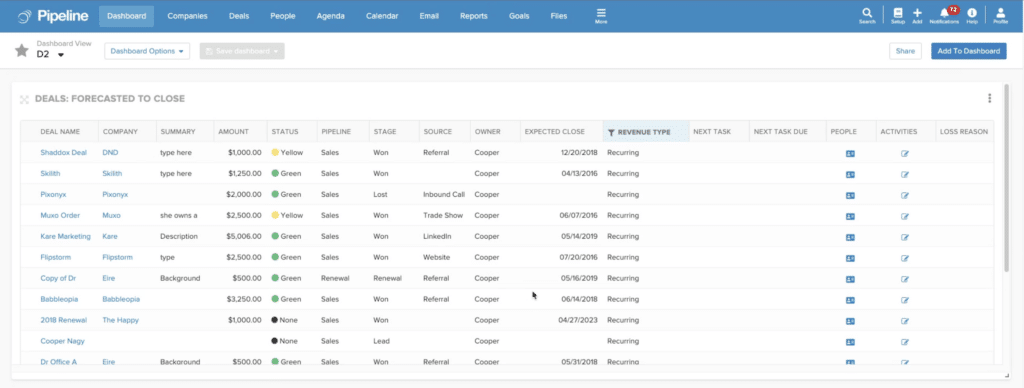Stuck in sales stagnation? Don’t blame your sales team just yet. Many businesses overlook a powerful tool that skyrockets growth: a Customer Relationship Management (CRM) system.
Think of thriving businesses as icebergs. The smooth success you see above the water is often supported by a robust CRM infrastructure. In fact, a study found that CRM adoption can lead to a 300% increase in conversion rate. Surely, you don’t want to miss this powerful sales tool to boost your business growth.
This blog explores eight reasons companies without CRMs often struggle to grow and how a CRM can fuel their sales engines.
1. Scattered Data
One of the main functions of CRM is to organize all your sales-related data. This includes your prospect information, sales activities, and communications. When you use spreadsheets to manage your business data, you are likely to have it scattered between tabs, separate Excel files, individual folders, and cloud data.
With CRM, you’ll have all the data you need at your fingertips. Some CRM solutions even offer advanced data customization options to make the data recording system match your team’s language.

2. Uncentralized Communication
Another reason companies without CRM software struggle to thrive is uncentralized communication.
Closing deals rarely happens on the first meeting. It often takes multiple meetings, follow-ups, and proposals, stretching the sales cycle over months. Without a CRM, keeping track of deal statuses and conversations becomes a nightmare. Information gets lost, and golden nuggets that could win deals slip through the cracks.
That’s where a CRM changes the game. Every customer interaction is automatically recorded, allowing you to trace back conversations and rediscover crucial details easily.
Some CRMs even offer dialer integration, automatically saving and transcribing your calls into the system. No more lost information, just a clear path to securing those deals.
To help you organize your sales processes, consider using our sales CRM Excel template. It’s a practical tool designed to streamline your sales workflow, especially if you’re transitioning between CRM systems.
Related: Learn 6 advantages of using dialer integration in CRM software.
3. Clogged Sales Pipelines
A CRM system brings order to the chaos. It establishes clear, defined stages within your sales pipeline, ensuring every lead receives the attention they deserve at the right time. Stuck leads go from “No Contact in 7 Days” to receiving a personalized re-engagement email. Deals nearing closure in the “Expected to Close This Month” receive a timely follow-up email to push them over the finish line.
Pro tip: Want to ignite those initial customer interactions? Steal our ready-made email introduction templates—they’ll get the conversation flowing in no time!
4. Drowning in Manual Tasks
Imagine spending less time on repetitive tasks and more time on high-impact activities like crafting proposals and researching market trends. A CRM automates these manual sales processes, freeing you to focus on what truly drives sales.
While some CRM offers automation focusing on email marketing campaigns, Pipeline CRM offers beyond that. Our smart assistant suggests the next step whenever a deal status changes, keeping your sales process smoothly. Do you have recurring deals? Pipeline CRM can also automatically create a new deal upon closure, eliminating tedious manual tasks
5. Delays in Response
Speed is key in sales. The faster you respond to a lead, the higher your chances of converting them. Leave it too long, and their interest fades, leaving you with lost opportunities. This applies not just to initial inquiries but also to customer support and identifying upsell and cross-sell potential.
A CRM with instant notifications keeps your team on top of everything. Get alerted whenever a deal status changes, an email gets opened, a customer hits a milestone, and more. This real-time visibility lets you respond quickly to inquiries and needs, leading to higher sales and happier customers.
6. Lack of Integrations With Third-Party Software
Closing deals requires juggling multiple tools: email, web forms, lead generation platforms, accounting software, and more. Switching between them is a recipe for wasted time and data errors. Imagine a central hub seamlessly connecting everything—that’s what CRM does.
With a CRM you consolidate your workflow. For instance, you can manage emails and communications from a single platform, automatically populate lead data from web forms into your CRM contacts, and segment new leads based on specific criteria for targeted outreach. CRM eliminates the need for time-consuming data juggling and minimizes human error. The result? A streamlined sales process that saves you time and maximizes efficiency.
7. Teams Work in Silos
Companies without CRM often work in silos instead of one unity. By centralizing all customer data and interactions within a CRM, your sales team gains a unified platform that is accessible from any device at any time. This streamlines task management, as everyone involved has a clear view of assignments and progress. Additionally, real-time access fosters strong collaboration, allowing team members to easily share information and support each other in addressing customer needs and resolving issues.
8. Poor Sales Forecasting and Reporting
Sales forecasting and reporting are crucial for making strategic business decisions. However, spreadsheets, a common tool for these tasks, have limitations. Spreadsheets rely on manual data entry, which is prone to errors and can’t offer real-time insights. This can lead to inaccurate reports and missed opportunities.
CRMs provide a more reliable solution. They automate data entry and calculations, minimizing errors. Additionally, CRMs offer real-time visibility into your sales pipeline and team performance, allowing you to address any potential risks proactively. CRM’s built-in analytics go a step further, helping you identify trends, predict future sales, and pinpoint areas for improvement. This level of analysis is much more cumbersome to achieve with spreadsheets.
Grow Your Business With the Right CRM Solution
As you can see, companies without CRM often struggle to thrive. On the contrary, CRM can empower your sales team to close deals faster and more efficiently—propelling your business forward. In fact, businesses that adopt a CRM have seen significant improvements, with an average sales increase of 29% and a productivity boost of 34%.
If you’re looking for an affordable CRM tool with powerful features, Pipeline CRM may be your answer. We’ve helped countless businesses across industries maximize their sales performance, like Rainier Custom Homes, which achieved a staggering 53% improvement in their time-to-close after streamlining their sales pipeline with Pipeline CRM.
Discover all the features Pipeline CRM offers. When you’re ready to try us, sign up for your free 14-day trial.



